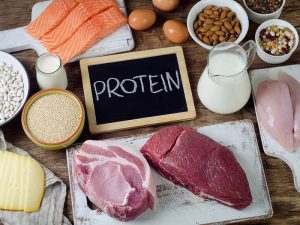 Decades of scientific research on weight loss have uncovered a few key pieces of information on what helps people successfully win the battle of the bulge.
Decades of scientific research on weight loss have uncovered a few key pieces of information on what helps people successfully win the battle of the bulge.
- First, we know that while exercise is important, a person’s healthy eating habits likely matters more for weight loss than the hours they spend in the gym.
- Second, when it comes to dieting, there is no single best one for losing weight; many diets can work quite well as long as total calorie balance is accounted for.
- Third, dietary protein is one of the key “levers” in a diet that increases the likelihood of someone’s ability to lose weight.
This article is going to cut through a lot of the noise surrounding protein and tell you how much protein you should be eating to lose weight and some of the things you should consider when planning your diet.
WHAT IS PROTEIN?
Protein is an important macronutrient that is involved in nearly all bodily functions and processes. It plays a key role in exercise recovery and is an essential dietary nutrient for healthy living. Protein and amino acids are primarily used to create bodily tissues, form enzymes, and cellular transporters, maintain fluid balance, and more.
HOW MUCH PROTEIN PER DAY TO LOSE WEIGHT?
If you want to lose weight, aim for a daily protein intake between .73 and 1 grams per pound. Athletes and heavy exercisers should consume 1-1.5 grams per pound if aiming for weight loss.
WHAT ARE THE BENEFITS OF PROTEIN IN WEIGHT LOSS?
Dietary protein can be an important part of a diet that is intended for weight loss. While there are many benefits to dietary protein, there are four main areas that have direct effects on weight loss:
- Satiety
- Lean mass
- Thermic effect of food
- Storage as body fat
Let us take a deeper dive into each of these topics.
PROTEIN HELPS YOU FEEL FULL LONGER
One of the biggest things that impede weight loss is hunger.
People are far less likely to stick with a nutrition or diet plan if they experience high levels of hunger.
Protein is the most satiating of all the macronutrients.
Several different lines of research have all pointed to the same thing: higher protein intakes tend to provide more satiety and less hunger.
For example, in one study, high protein snacks allowed people to go longer between eating and also caused them to eat less at subsequent meals.
Another study showed that including protein into a glass of water decreased hunger compared to water alone.
Depending on the source of protein, there does appear to be minor differences in the exact amount of satiety that protein provides, however these differences are minor and don’t really make a meaningful impact for most people.
Currently, there is no consensus on the optimal level of daily protein intake in one’s diet with regard to staying full. However, roughly .82-1.32 grams of protein per pound appear to provide substantial benefit on satiety.
PROTEIN PRESERVES LEAN BODY MASS
In addition, protein has another benefit on weight loss: it helps preserve lean body mass during periods of caloric restriction.
One study compared the effect of low protein intake (1.0 grams per kilogram per day) to high protein intake (2.3 g/kg per day) on lean body mass over a short term caloric deficit. On average, the low protein group lost about 1.6 kilograms (3.5 pounds) of muscle mass while the high protein group only lost 0.3 kg (0.66 pounds) of muscle mass.
Currently, most evidence suggests that .73 grams of protein per pound are a recommended daily target for protein intake to spare lean body mass loss during periods of weight loss.
PROTEIN INCREASES THE THERMIC EFFECT OF FOOD
The thermic effect of food is the “cost” of digesting your food.
Essentially, it takes some energy to break food down, digest it, and turn it into energy. Protein has the highest “cost” of all three macronutrients.
While the total effect that the thermic effect of food has on daily energy expenditure and weight loss is small, it is not meaningless and is important to note.
In one study, a high protein diet increased the thermic effect of food by roughly 6-8 kcals per hour when compared to a low protein diet, which may translate to ~50-75 calories per day.
However, not all studies show this large of an effect, and the thermic effect of protein is not likely responsible for most of its benefit, but it may be the “cherry on top” of adequate dietary protein during weight loss.
PROTEIN IS HARD TO STORE AS BODY FAT
During periods of weight loss, there are often times where more energy is consumed than expended. As such, minimizing how much of that excess energy (i.e. calories) is stored as fat is important.
The body processes the three different macronutrients (i.e. proteins, carbohydrates, and fats) in very different ways.
Leaving out a lot of jargon and mumbo jumbo, in order for protein to be stored as fat, it goes through a much different biochemical process than either carbohydrates or fats.
This process makes it much harder for protein to store as body fat.
One study found that protein is stored as body fat with roughly 66% efficiency, while carbohydrates store with 80% efficiency and fats store at 96% efficiency.
During weight loss, overeating protein results in much less stored body fat than overeating on carbohydrates or fat.
While many different diets can be successful for weight loss, the protein content of a diet is one of the important factors to consider when planning a diet. Protein has been shown to promote satiety, help maintain lean body mass, increase the thermic effect of food slightly, and can reduce how efficient the body is at storing extra calories as body fat.
Courtesy of NASM.org

 Ingredients:
Ingredients: Your diet tends to evolve along with the number of candles on your birthday cake. For example, in your hard-training teens and early 20s, you could probably eat at Taco Bell several times a week and still remain fairly lean. That changes during your 30s and 40s. After turning 50, many people start dropping their calories in response to an ever-slower metabolism.
Your diet tends to evolve along with the number of candles on your birthday cake. For example, in your hard-training teens and early 20s, you could probably eat at Taco Bell several times a week and still remain fairly lean. That changes during your 30s and 40s. After turning 50, many people start dropping their calories in response to an ever-slower metabolism.
